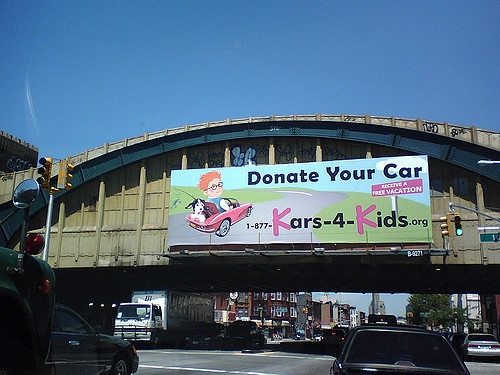
May 4, 2017; Minneapolis StarTribune
NPQ has written before about car donation programs that fell into the crosshairs of various state attorneys general. The classic profile of these charities includes spending very little on actual charity and a great deal on processing the vehicles. Too often, the vendors they use to process the donated cars are owned by and employ family members or close associates of the directors of the so-called charity. Many of these fundraising schemes are relatively obscure and local, but one of them, Kars4Kids, is not only national (operating in all fifty states) but also highly recognizable for its infectious jingle.
On the other hand, how many among the general public know that Kars4Kids is directly affiliated with—and sends 90 percent of those proceeds that go to charity to—Oorah, a single youth charity in New Jersey which, according to tax forms, is “a Jewish outreach organization for the purpose of imparting Jewish education, values, and traditions, as well as guidance and support, to Jewish children who lack access to these fundamentals”? A scant few, asserts Minnesota Attorney General Lori Swanson, whose office has just done a compliance audit on the organization and issued a 300-page report, finding among other things that out of $3 million raised in that state from 2012 to 2014, less than $12,000 went to children’s services in Minnesota. Now, there’s absolutely nothing wrong with that, unless the public is given the impression that the charitable spending is going elsewhere. In this case, as in many, it is often just left vague. She additionally found that though Kars4Kids reports spending 63 percent on mission, in actuality, of the $88 million raised nationally from 2012 to 2014, only 44 percent was given to charity, with $40 million going to Oorah. (When it comes to car donation programs in general, that 44 percent probably puts it on the high side, actually.)
Swanson believes that the charity has not been forthcoming about these facts and that it gives donors the wrong impression. For its part, the organization responds that there’s just no time in a 60-second commercial to go into all that.
A write-up of this same organization from 2015 suggests that Kars4Kids may not have actually violated any regulations through omission of an explicit description of what charities would benefit. But there are other issues: In line with other such programs, a troublesome family member lurks in the background. Swanson points out that Kars4Kids and Oorah lost $9.2 million through failed real estate investments made by the charity director’s second cousin. As was reported in the Forward by Jonathan Nathan-Kazis in 2012:
Oorah also aimed to raise money by investing in real estate development. It’s not clear when the group began investing with developers, though auditor reports note investments going back to 2008. Reports filed with the Office of the New York State Attorney General do not specify the names of the developers involved or the specific locations of the projects, but by comparing descriptions with press accounts, it appears that at least two of the investments were made with a developer named Leib Puretz.
Sign up for our free newsletters
Subscribe to NPQ's newsletters to have our top stories delivered directly to your inbox.
By signing up, you agree to our privacy policy and terms of use, and to receive messages from NPQ and our partners.
This is hardly a respectful use of the money raised from donors in Minnesota, but that is not the end of it. Nathan-Kazis also reports that Oorah has also recently been embroiled in a scandal after it secretly bought a building from another synagogue to establish its own fake synagogue under the moniker “Congregation Oorah.” Changing its status to a religious organization would have protected its financials from public scrutiny in that, as a religious congregation, it would not have had to file an IRS Form 990 as required of other nonprofits. When the congregation that the building was bought from understood what the plan was, it sued to reverse the sale.
“The benefit to Congregation Oorah of obtaining tax-exempt status as a religious congregation…is that it would not have to file an annual tax return,” Young Israel attorney Solomon Rubin wrote in an affirmation filed in New York State Supreme Court on October 13th. “By having a related entity that does not have to do so, the Respondents could put their more questionable financial dealings through an entity that would not be subject to the same public scrutiny.”
This is not the first investigation that Swanson’s office has done on such programs. We reported in 2015, in a newswire entitled “Nation’s Largest Car Donation Program a Self-Dealing Mess,” about that office’s investigation of Car Donation Foundation, which is something of a poster child for the unattractive industry model.
Other actions aimed at K4K resulted in settlements in Oregon and Pennsylvania, where the charity was also charged with misleading donors.
Swanson has forwarded her report on to the IRS, which has the power to revoke the organization’s tax-exempt status, but perhaps even more significantly, she is talking with her colleagues in other states about her findings. This is significant because, as we described in our recent issue on the nonprofit regulatory environment, there is a new willingness among states’ attorneys general to work together on multi-state enforcement issues. —Ruth McCambridge













